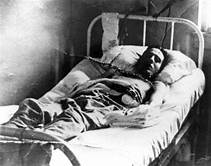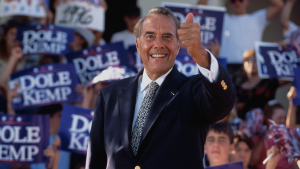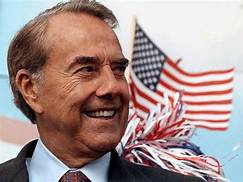It was 1967 and I had recently enrolled at the University of Kansas in Lawrence on the G.I. Bill after serving almost four years in the U.S. Army Security Agency.
At the time I was working at the Lawrence Journal-World newspaper in the composing room. My job was to “kill” type—meaning I was to dump all of the lead type and slugs from used galleys into a “hellbox.”
The hellbox was a heavy metal bin on wheels that I would push to a big furnace where I would dump fifty or sixty pounds of the lead type so it could be melted down and used again.
It was hard, dirty work, but I was majoring in journalism and I told the publisher of the Journal-World that I wanted to learn the news business from the bottom up.
“Then you need to begin as a printer’s devil,” he said.
It was while I was doing that job that the Journal-World had a visitor. It was the late Bob Dole, the Republican congressman who represented Kansas in the House of Representatives.
At the time he was running for Senator from Kansas—a step up from his job in the House. He had spent about an hour with Dolph Simons, the Journal-World’s Publisher and the paper’s editorial board seeking the paper’s endorsement.
After that cerebral event, Dole asked for a tour of the less bookish areas of the newspaper. That’s how he happened to arrive in my dingy, hot, lead-filled world in the nether regions of the newspaper.
As I recall, Dole was wearing a blue suit. I was wearing blue jeans, a t-shirt, and a heavy apron to protect me from any molten lead that might fly my way.
Dole extended his left arm. I wasn’t sure why, but then I noticed his right arm was partially paralyzed—the result of a severe wound he suffered during World War II in Italy as a lieutenant in the U. S. Army.
As I would later learn, a German machine-gun bullet struck his upper back and right arm, shattering his collarbone and part of his spine, paralyzing Dole from the neck down. After several operations and years of rehabilitation, Dole recovered, but his right arm retained only limited mobility and his left arm was partially numb.

So, with his left arm extended toward me, I shook his hand with my left hand. At that point, Mr. Simons explained that I had just enrolled at K.U. on the G. I. Bill and was majoring in journalism.
“Where’d you serve?” Dole asked.
“With the U.S. Army in Germany,” I replied.
“What was your job?”
“I was with the Army Security Agency collecting and analyzing signals intelligence from the Soviet Union and its Warsaw Pact allies.”
“So, you are going from doing top-secret work to a job where there are no secrets,” Dole said.
I thought that was a very perceptive statement.
“Yes, maybe it’s a reaction to almost four years of not being able to talk about what I did,” I said.
“So, do you want to work at the Journal-World when you graduate?” Dole asked. I looked at Mr. Simons. I wasn’t sure how to answer that question, but I figured honesty was the best policy.
“Well, my goal is to be a foreign correspondent and that means I will have to go to a paper that has foreign bureaus,” I responded.
“Or, you could get a job in Washington,” Dole said. “God knows, Washington could use a few good journalists to offset the bad ones that are already there.”
“That’s always a possibility,” I replied. “At this point, I’m still learning what journalism is all about.”
“Well, it should be about finding and reporting the truth,” Dole said, “but unfortunately, that isn’t always the case.”
I wasn’t sure what to say, so I just nodded and shrugged slightly.
“Well, anyway,” Dole said, extending his left hand again, “nice talking to you and good luck with your career.”
As it turned out, I was hired by the Chicago Tribune upon graduation, and after about five years as a general assignment reporter and assistant City Editor, I was posted to Tokyo as the paper’s Far East Correspondent.
I never met Bob Dole again, but I followed his political career assiduously. He struck me as an honest and honorable man and I was disappointed when he lost the 1996 presidential election to incumbent Bill Clinton.

I respected Dole for his military service. He earned two purple hearts and a bronze star in service to his country.
Later, after his political career ended in 1996, I watched him begin a new career as a pitchman for such products as Viagra, Visa, Dunkin’ Donuts, and Pepsi Cola. He was also a political commentator on television and even made self-deprecating guest appearances on Comedy Central’s “The Daily Show with Jon Stewart” and “Saturday Night Live.”
Dole wrote several books, including one on jokes told by the presidents of the United States, in which he ranked the presidents according to their sense of humor. Dole released his autobiography, One Soldier’s Story: A Memoir, in 2005. The book chronicled his World War II experiences and his battle to survive his war injuries.
Of course, I have to admit, I am a bit prejudiced when it comes to Bob Dole because, like me, he was a native Kansan. He was also an alumnus of the University of Kansas where he played basketball, football, and ran track before cutting his university career short to join the Army during the war. Bob Dole was a true Jayhawker.
“Rock Chalk,” Senator Dole! RIP.



Ron, you hooked us then left us hanging. Please tell us, which president did Senator Dole judge as having the best sense of humor?
Sorry about that. The funniest (Abraham Lincoln) & the least funny (Millard Fillmore). I think Ronald Reagan was just behind Lincoln.
Thank you. I’m from the government, and I’m here to help you.
Yikes. The 10 most dangerous words in the English language, according to Ronald Reagan!